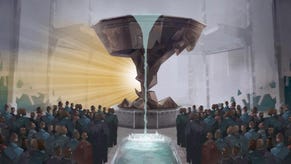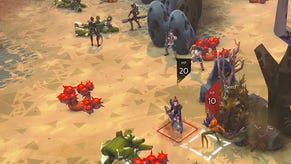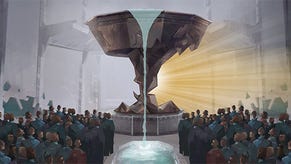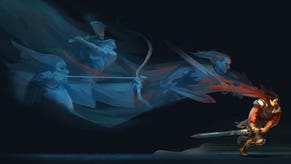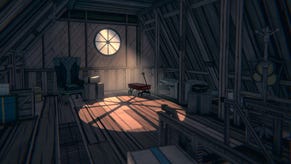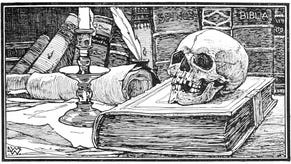How Kickstarter Got Gay Marriage Into Massive Chalice
For The Good Of The Realm
In Double Fine's Massive Chalice, heroes follow one of (videogame) life's most well-worn paths: fight demons, fight demons, fight demons. But these heroes age, and their blood slowly ceases its boiling. They grow old and begin to seek out someone else to warm their weary bones. Also, to birth and raise the most powerful combat babies in all the realm because, you know, demons. Still, it's a rather traditionally minded system at heart, so I had to ask: where do gay couples enter the picture, if at all? Massive Chalice lead Brad Muir was honest: that issue totally slipped his mind... at first. But then Kickstarter backers swooped in to save the day. Hurrah! It is, however, an ending that Muir doesn't think would've been quite so happy had a traditional publisher been in the mix.
To hear Brad Muir tell it, Tim Schafer makes worlds first and systems second. Muir, meanwhile, does it the other way around. He just makes things work, then he worries about the details.
He acknowledges, however, that maybe this time around, he should've worried about the details a teensy bit sooner.
“We did not talk about [the possibility of gay marriage] until we launched the Kickstarter," he tells RPS. "We were so focused on pure pragmatic mechanics and how it would work and coupling and all these things that we hadn't [considered it]. That was something I got kinda blindsided by. That was really unfortunate. It kinda makes me feel shitty that it's not something I'd thought of. I think it's sort of hetero privilege that I didn't see it coming.”
It's not that Muir doesn't want his game to embrace people of all codes, creeds, and backgrounds, either. He just made a mistake. But then, that's why Double Fine opted to bring the idea of Massive Chalice straight to Kickstarter instead of going with a stretch goal and prototype-oriented "pre-order model": because they know they're not perfect.
"One of the cool things is we have the opportunity to think about it and address it because we brought it to the community," says Muir, suddenly grinning. "We brought it to a broader group of people, and then there were some people who brought it up and wanted to talk about it. There's a raging thread on our forums.”
So hurrah, hugs and well-muscled sexytimes for all. This, Muir figures, is the optimal outcome. Everybody wins, and then they all get married. But what would've happened if Double Fine hadn't fulfilled the conditions to unlock real life's good ending? The contagious enthusiasm in Muir's voice wilts a bit as he explains:
"If we had gone with a publisher on this, I really think [it wouldn't have ended well]. Because you sign the deal, you go underground, you start working on the game, you don't talk to the community or anybody, and you get so focused on all these other aspects of the game. Just making it work – and all the tactical combat and mechanical things. We might just overlook something like same-sex coupling all the way until we announce the game. And then people say, 'Hey, what about gay marriage?' And we're like, 'Fuck,' because we've already worked on it for more than a year.”
“If somebody did think about it during that whole thing, they would've probably just killed it because it is such a controversial issue. They'd probably not want to have it associated with the game at all. And then they'd give me a PR company line that I'd have to tell in every interview, and it'd be super, super shitty. And then any gay gamers who are coming to the game and playing it and wanting to see themselves represented would just be really disappointed.”
Either way, no bueno. Fortunately, Double Fine was able to reconsider their systems ages before ever implementing them, and the resulting discussion's given rise to some rather interesting ideas.
“We've been talking about ways to actually incorporate gay marriage," Muir continues. "One of the suggestions was to allow couples - male/female or otherwise - to contribute to the good of the realm via means other than childbirth. So couples could raise children or research technology. That's one interesting way to handle it. And then if you couple it with the ability to foster children, I think that's a way you could have same-sex couples in the game. And it's optional. People can choose to engage it or not.”
“The other option is to be less explicit about it. Maybe these aren't marriages. Maybe you're just retiring two heroes in the same keep. Because I really like it when more procedural, systemic games allow the player to kind of use their imagination a little more to fill in the gaps of what's actually happening.”
Ultimately, though, Muir is keen to point out that Massive Chalice still has a long way to go. Someday, the chalice will be massive indeed, but at this point it's not even on level with Chip from Beauty and the Beast. But he's aware now. His eyes and ears are open. And while his absolute foremost goal is to make the best, most enjoyable game possible, he also wants everyone to come along for the ride.
"I don't know where we're gonna land on it," he admits, "but I will say that I want the game to be inclusive. I don't think that hurts anyone. If you as a gamer feel like you're more represented in this thing, that's only gonna deepen your personal story. I really like emergent story stuff, and I think that only stands to improve emotional connections to these heroes. That's only gonna be a good thing.”
Check back soon for the full interview, in which we discuss plans for everything from ground-level combat to Civilization-style multi-generational mechanics, emergent game systems, whether or not Double Fine's truly done with publishers, the potential dishonesty of rooting a Kickstarter in ideas instead of confirmed features, Muir's frightening inability to stop almost killing himself, and ska music.





